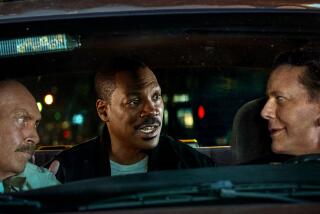THE NHL : Murphy’s Law: A New League Never Hurts
- Share via
Consider yourself a sports expert?
OK, name the man who has been a key figure over the last quarter-century in transforming professional sports into a multibillion-dollar empire that stretches across North America with growing designs on the European continent.
Did you say Pete Rozelle? Peter Ueberroth? David Stern?
Wrong, wrong, wrong. Their influence was limited to one sport each.
Try Dennis Murphy.
Unless you’re a true sports aficionado, your response is likely to be: Who?
The operator of an Orange County-based sports consulting business, Murphy has never been one for headlines. His name has usually been limited to the small print.
But he’s had his fingers in more pies than Marie Callender. Murphy has been a sort of midwife for the birth of new leagues.
Twenty-five years ago, he was working to bring an American Football League franchise to Orange County. It never happened, of course, because the AFL merged with the National Football League several years later.
Undaunted, Murphy helped found the American Basketball Assn. and served as general manager of its Miami Floridians. Eventually, the ABA became part of a strengthened National Basketball Assn.
Then Murphy got in on the founding of the World Hockey Assn. and the management of the Los Angeles Sharks.
Same result. The remnants of the WHA became part of a strengthened National Hockey League.
“I’m of the opinion that there shouldn’t be one of anything,” Murphy said. “Why shouldn’t there be two or three to choose from? You have two or three makes of cars to choose from, two or three newspapers. Why not leagues?”
You’d think that, at 61, Murphy might be satisfied to sit back and smile smugly at the changes he has wrought.
No way. The man is at it again.
He’s now working with Michael Gobuty to launch the Global Hockey League.
And as always, he’s facing the arguments he’s run into every time: It will never work. There’s no market for it. There are no players.
This league is unique in that one of its two divisions will be in Europe.
“We have definite commitments from Germany, England, France and Czechoslovakia,” said Gobuty, the GHL chairman. “And negotiations are continuing with other European prospects.”
The inclusion of Czechoslovakia will mark the first time an Eastern European franchise has been a part of any league outside the old Iron Curtain.
The North American division will have teams in California, with San Diego a strong possibility; Albany, N.Y.; Providence, R.I., and somewhere in the Southeast, plus Canadian clubs in Saskatoon and Hamilton.
“We’d be crazy to go up against the NHL,” Murphy said, “but by going international, it’s a different ballgame. International sports are just developing. Timing is most important. With the way things have been going over in Eastern Europe, there are new markets opening up. I wish I was a young guy with the future to look forward to.”
He also thinks the destruction of the old political order has shot holes in the theory that the pool of talent would be drained by another league.
“There are going to be so many players, you can’t believe it,” he said. “With the Eastern Bloc barriers broken down, there are going to be hundreds who can play this level of hockey. There is no doubt we are going to have more than enough.
“With freedom exploding all over the place in Eastern Europe, it’s a different world. In the past, their leaders told their players, ‘We won’t let you do this and that.’ Those days are over with.”
Besides, Murphy stressed, he heard the same arguments in his first hockey venture.
“Remember, in the old WHA, one of the members of the Edmonton Oilers was Wayne Gretzky,” he said. “Both he and Mark Messier were young players who were given a chance to develop. There’s a lot of talent out there. We are going to develop our own stars.”
They apparently will have to do so, with a $2.5-million salary cap for each GHL team.
Travel would seem to be a huge expense, but GHL officials hope to hold it down by having only two intercontinental trips per season per team. For example, the Providence club would play all its games against North American opponents except for two eight- to 10-day swings through Europe. Providence would play each European club once on each trip.
The only other time the two continents would clash would be in the best-of-seven league finals.
The season is scheduled to start on Nov. 1 and conclude in April 1991.
Gobuty is the main figure in the league’s structure, just as Gary Davidson had the high-profile leadership role in both the ABA and the WHA at their inceptions. Murphy, as always, is in the background, where he feels most comfortable. He has never been a money man, but always a mover and shaker.
“My function has always been to put things together and I’ve done a fairly good job of that,” Murphy said.
Mergers seem to be his legacy, but he is convinced we ain’t seen nothing yet.
“People who say sports has saturated the market are wrong,” Murphy insisted. “With the opening of international markets, sports haven’t even started yet.”
When it does, Dennis Murphy will likely be there.
Add GHL: The first club to announce some of its personnel is the Providence-based New England Clippers.
The team’s general manager-coach will be NHL Hall of Famer Brad Park.
Mike Eruzione, star of the gold medal-winning 1980 U.S. Olympic team, will serve as a special assistant to the team president.
More to Read
Go beyond the scoreboard
Get the latest on L.A.'s teams in the daily Sports Report newsletter.
You may occasionally receive promotional content from the Los Angeles Times.






